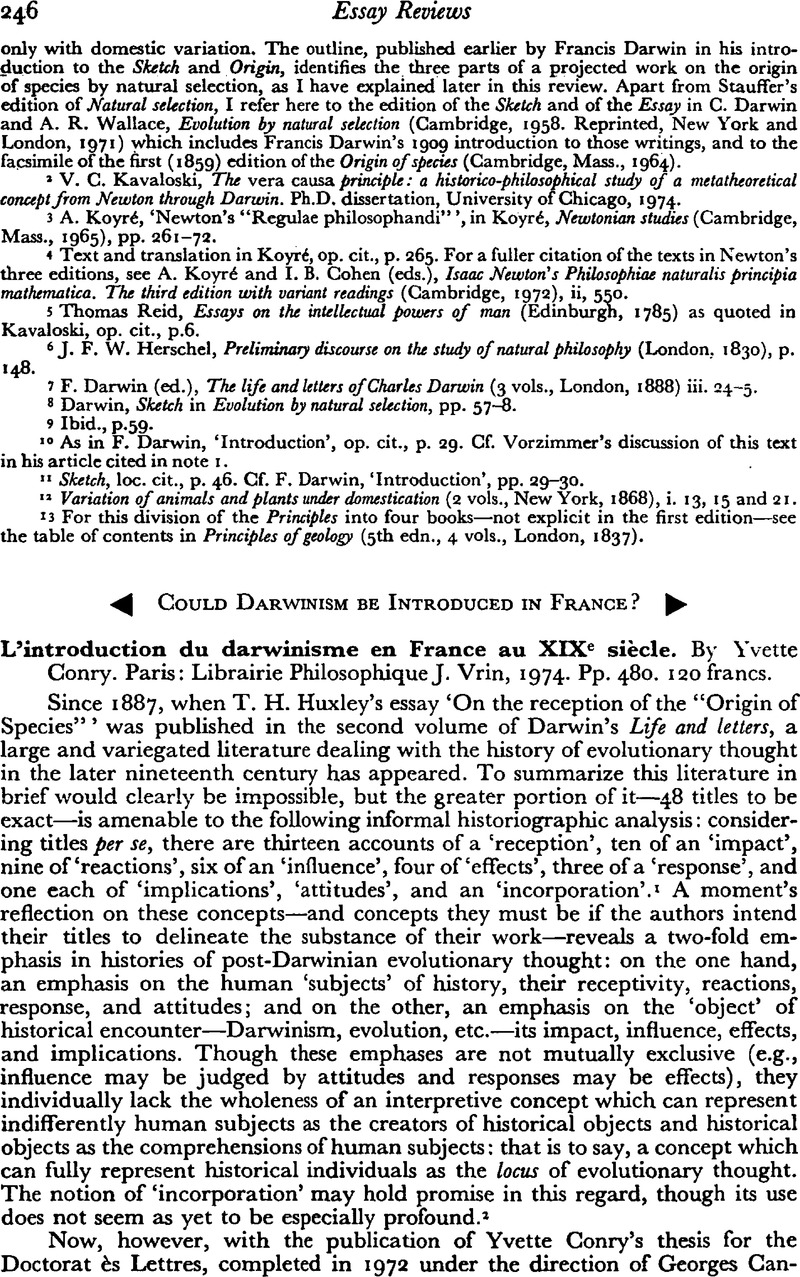Article contents
Could Darwinism be Introduced in France?
Published online by Cambridge University Press: 05 January 2009
Abstract

- Type
- Essay Reviews
- Information
- The British Journal for the History of Science , Volume 10 , Issue 3 , November 1977 , pp. 246 - 251
- Copyright
- Copyright © British Society for the History of Science 1977
References
1 See Moore, James R., ‘The post-Darwinian controversies: a study of the Protestant struggle to come to terms with Darwin in Great Britain and America, 1870–1900’ (Ph.D. thesis, University of Manchester, 1975), Pt. VIII.Google Scholar
2 See Peterson, Clifford Harold, ‘The incorporation of the basic evolutionary concepts of Charles Darwin in selected American college biology programs in the nineteenth century’ (Ed.D. dissertation, Columbia University, 1970).Google Scholar
3 Canguilhem, Georges, ‘L'object de l'histoire des sciences’, Etudes d'histoire et de philosophie des sciences (Paris, 1968)Google Scholar. Cf. Lecourt, Dominique, Marxism and epistemology: Bachelard, Canguilhem and Foucault, (London, 1975)Google Scholar and the review by Counihan, Terry, ‘Epistemology and science—Feyerabend and Lecourt’, Economy and society, v (1976), 85ff.Google Scholar
4 This study has been initiated by Camille Limoges in his thesis, completed in 1968 under the direction of Prof. Canguilhem, , La sélection naturelle: Etude sur la première constitution d'un concept (1837–1859) (Paris, 1970)Google Scholar. The present writer has undertaken research on the development of Darwin's religious views.
5 See the trenchant review by Roger, Jacques, ‘Darwin en France’, Annals of science, xxxiii (1976), 483–4Google Scholar. In conclusion Roger asks (quite justly in our opinion) ‘s’il n'eût pas été plus simple de partir de Darwin lui-même et de ce qu'il avait écrit, plutôt que d'un darwinisme fantôme dont l'existence au ciel des Idées complique assez inutilement les problèmes' (p. 484).
6 Reference might have been made to G. L. Figuier, whose popular expositions of the breadth of natural history appeared annually from 1863 to 1872; to About, Edwin, Le progrès (1864)Google Scholar; Mellier, Antoine, Les habitudes héréditaires (1878)Google Scholar; and Topinard, Paul, Science et foi (1900)Google Scholar; and to more of the literature in English, e.g., essays by Walter Cannon and Robert M. Young, which anticipate several of Conry's conclusions.
7 Stebbins, , ‘French reactions to Darwin, 1859–1882’ (Ph.D. dissertation, University of Minnesota, 1965)Google Scholar and ‘France’, in The comparative reception of Darwinism, ed. by Click, Thomas F. (Austin, Texas, 1974), pp. 117–63Google Scholar; Clark, , ‘Social Darwinism and French intellectuals, 1860–1915’ (Ph.D. dissertation, University of North Carolina, 1968)Google Scholar; Farley, , ‘The initial reactions of French biologists to Darwin's “Origin of Species”’, Journal of the history of biology, vii (1974), 275–300CrossRefGoogle Scholar; and Paul, , ‘Religion and Darwinism: varieties of Catholic reaction’, in The comparative reception of Darwinism, pp. 403–36Google Scholar. Stebbins' observation (‘France’, p. 157), that until about 1880 Roman Catholics were far more concerned with geology in relation to the Bible than with transformism, might profitably be explored. In addition to books cited by Conry, see de Serres, P. T. Marcel, De la cosmogonie de Moïse (1860)Google Scholar; Reusch, H. F., La Bible et la nature (1867)Google Scholar; Molloy, G., Géologie et révélation (1875)Google Scholar; Gainet, J. G., Accord de la Bible et de la géologie (1876)Google Scholar; de Marin Carranrais, E., Études sur les origines (1876)Google Scholar; Motais, A., Origine du monde d'après la tradition (1888)Google Scholar; and Vigoureux, F.. La cosmogonie mosaïque (1889).Google Scholar
- 3
- Cited by


